#Carbonfootprintconsultancy
Text
Why is achieving net zero so urgently crucial to the battle against climate change?
We are a Carbon footprint consultancy in Agile Advisors, Significant reductions in greenhouse gas emissions are needed in all economic sectors to reach net zero. Notably, the energy sector, responsible for about three-quarters of emissions, must dramatically cut carbon dioxide emissions by transitioning from fossil fuels to renewable energy sources like solar and wind power for electricity generation. It is currently expensive and challenging to eliminate emissions from certain industries, such as cement, aviation, and shipping, to zero within the timeframe set by the Paris Agreement. Consequently, 'residual' emissions will persist, and an equal amount of 'negative emissions'—which must be removed from the atmosphere—will be necessary.
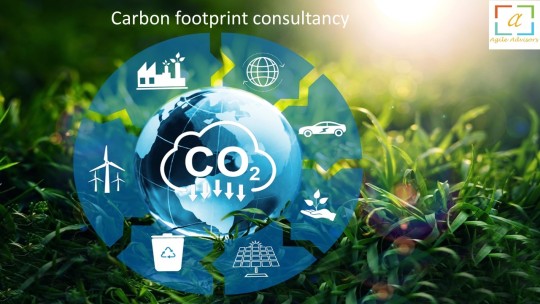
Agile Advisors, a leading Carbon footprint consultancy In Dubai, achieving net zero across an economy can be accomplished by offsetting from industries like land use and power, which have the capacity to deploy greenhouse gas removal technologies. These methods, which include Direct Air Capture (DAC) and Bioenergy with Carbon Capture and Storage (BECCS), have their unintended adverse effects, can be costly and energy-intensive, and have yet to be proven at scale. Natural solutions such as tree planting and land management modifications that enhance the amount of carbon trapped in soil can also reduce greenhouse gas emissions. International offsets are a tool that governments can utilize to achieve their own net zero goals.
Agile Advisors provide Carbon footprint consultancy In UAE, Offsets are particularly useful when a nation finds it challenging to cut back on some of its domestic emissions, such as when it has a sizable oil and gas sector, similar to Norway. Acquiring offsets enables a nation to fund projects aimed at reducing its emissions outside of its boundaries, although it is occasionally criticized for "shifting the problem elsewhere." In many countries, the management of offsets needs to be improved. Climate experts emphasize that reducing domestic emissions is the primary strategy for achieving net zero emissions and preventing severe climate change, given the limitations of negative emissions technology and the objections to offsetting.
In our opinion, we are Carbon footprint consultancy, less encouragingly, the Net Zero Tracker shows that while net zero laws are rising, over 75% of national and local governments need to disclose whether they plan to use external offsetting to reach their goals. Businesses and the financial sector are also making net zero pledges, and they are doing so more quickly. It is envisaged that these initiatives, along with those from regions and cities, will both directly aid in achieving the Paris targets and persuade governments at the federal level to increase their commitment to cutting emissions. Several programs are in place to assist the private sector in cutting emissions by the Paris Agreement. These include guidelines for establishing credible obligations and standards that may be used to track advancement, identify gaps, and hold organizations accountable.
Being a Carbon footprint consultancy In Dubai, Cities are moving in coalitions and independently to cut emissions (for example, London has extended its Ultra Low Emission Zone to become the largest zone of its kind in Europe). For instance, to "raise climate ambition" and help achieve the 2050 net zero target, over 1,000 cities and local governments have signed up for the Cities Race to Zero. More than half of all people live in cities, and since they contribute significantly to emissions, have the potential to experience immediate adverse effects from climate change, and can vote to influence national policy in democracies, cities play a critical role in climate action.
0 notes
Text
About to know carbon footprint
The carbon footprint, also known as the greenhouse gas footprint, is a measurement of the total amount of greenhouse gases released by a particular activity, good, entity, or nation. Carbon footprints are typically expressed in tons of emissions (CO2-equivalent) per comparative unit, such as per person, year, protein kilogram, or kilometer traveled.
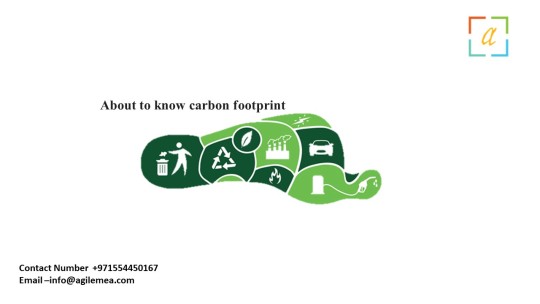
The emissions for a product's complete life cycle, from production through the supply chain to final consumption, are included in the product's carbon footprint. Similar to an individual, an organization's carbon footprint comprises both direct and indirect emissions that the organization is responsible for (referred to as Scope 1, 2, and 3 in the Greenhouse Gas Protocol, which is used for the carbon accounting of companies).
Depending on whether the focus is on a nation, company, product, or person, there are several approaches and online tools available to assess the carbon footprint. Customers may choose a product based on its carbon footprint, for instance, if they want to be environmentally conscious. The carbon footprint can be used to distinguish between economic activities with high and low carbon footprints in the context of reducing climate change. In other words, the idea of a carbon footprint enables everyone to compare the effects that different people, things, businesses, and nations have on the climate. Creating goals and plans for minimizing the carbon footprint is aided by this.
The carbon dioxide equivalent (CO2eq) per unit of comparison is a standard way to express the carbon footprint. It totals all greenhouse gas emissions—not just carbon dioxide—that are produced by various organizations, events, businesses, and other activities. Other definitions simply consider carbon dioxide emissions, leaving out emissions of other greenhouse gases such as nitrous oxide and methane.
One advantage of complete carbon footprint reporting (including emissions under Scope 3) is that it closes gaps in existing frameworks: Currently, international transportation is not counted in a country's GHG inventory for the UNFCCC. Instead of accounting for the production of goods and services (which may be imported) on behalf of residents, which is known as consumption-based accounting, GHG emissions in such inventories are from domestic activities (also known as territorial-based accounting or production-based accounting). This type of complete carbon footprint reporting, also known as consumption-based carbon accounting, places the onus of responsibility for emissions on final demand, or on those who use the goods and services.
0 notes
Text
The Value of Carbon Footprint Estimation Boundary
Businesses are becoming more aware that there will soon be worldwide regulations governing as a Carbon footprint consultant emission, most likely in the form of an emissions trading system. Companies throughout the world are now thinking about the magnitude of their carbon emissions, sometimes known as their "carbon footprint," and the ways to minimize these emissions as a result of years of debate, the release of the Intergovernmental Panel on Climate Change's fourth assessment report, and growing demands from shareholders and retailers. Because carbon footprinting is a relatively new practice, it is understandable that there is uncertainty over the ideal methods and parameters to utilize for these impact evaluations.
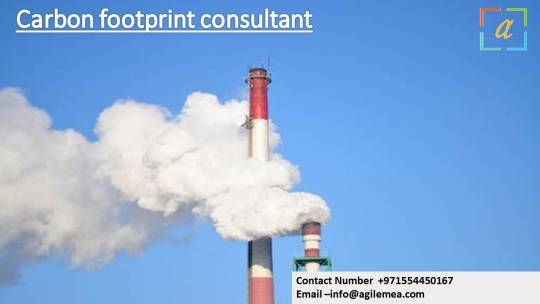
As an expert Carbon footprint consultant in UAE given the term's increased use over the past ten years, the "carbon footprint" concept is somewhat ambiguous. The phrase originates in "ecological footprinting" literature, which attempts to quantify the entire amount of land required to provide a certain level of human consumption sustainably.
In our opinion as Carbon footprint consultant , the ecological footprint is, by definition, a complete life-cycle analysis because the land used to produce most consumer goods is generally located some distance from the end user in both time and space. This appears to be different for the phrase's replacement, the carbon footprint, according to Weidman and Minx's research, which discovered a wide range of definitions that vary in the gases taken into consideration, the analysis's limits and various other factors.
The California Climate Action Registry (CCAR) and, more recently, The Climate Registry (TCR) are popular sites for describing and computing as an expert Carbon footprint consultant in UAE. Companies must report all direct emissions from their buildings, business cards, and power, steam, heating, and cooling purchases under CCAR/TCR. They recommend reporting emissions for all of the Kyoto Protocol greenhouse gases (GHGs): carbon dioxide (CO2), nitrous oxide (N2O), methane (CH4), hydro fluorocarbons (HFCs), per fluorocarbons (PFCs), and sulfur hexafluoride (SF6), while CCAR permits enterprises to start with simply CO2. The World Resources Institute (WRI) and the World Business Council for Sustainable Development (WBCSD) have also created a GHG protocol with a supporting Web site to aid corporate footprint efforts.
Most procedures, including the WRI/WBCSD, categorize as a Carbon footprint consultant inventories into progressively larger "tiers" or scopes. The direct emissions of the organization itself emissions from are included in the definition broadening the threshold to cover the carbon emissions of the organization's energy inputs, considering that the energy sector is a significant source of GHG emissions. An optional fourth tier broadens the boundaries to include "other indirect activities," clearly defined but presumably encompass other known sources of GHG emissions for an industry. In this research, we take into account the potential inclusiveness of the tiers, as previously stated, for a corporation.
0 notes
Text
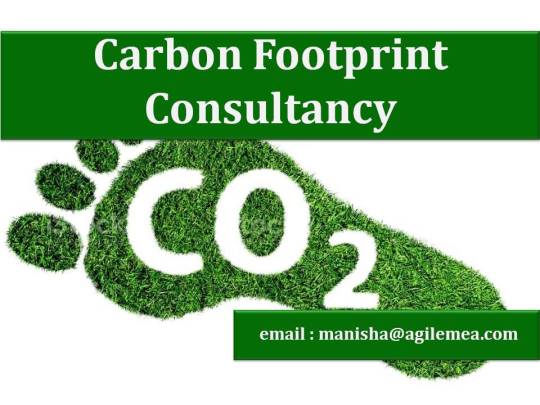
Agile Advisors, a prominent carbon footprint consultant in India, will work with your business to identify the energy consumption and carbon emission features that need to be disclosed. We will confirm which components of the operation are covered by the disclosure effort. Together, we will compile the data required to produce an energy and carbon emissions statement that satisfies all applicable legal reporting requirements and any optional programmes in which the company has opted to take part.
#Carbonfootprintconsultancy#Carbonfootprintconsultant#CarbonfootprintconsultantInIndia#CarbonfootprintconsultancyInIndia
0 notes
Text
Why Carbon Footprint estimation is more important?
Growing interest in "carbon footprinting" is a result of rising public concern over climate change and global warming. The necessity to cut greenhouse gas emissions in order to slow down climate change is now acknowledged by the international community. The use of alternative energy, reforestation, trash reduction, and energy efficiency are the most often used strategies for reducing carbon footprint. The main factors in calculating a country's carbon footprint are its population, economic output, primary energy mix, and carbon intensity.
We are carbon footprint consultant in India, The most important measure of environmental responsibility is carbon footprint, which aids in identifying climate impacts and reducing them cost-effectively through operational and strategic planning, the creation of a climate policy, environmental reporting, etc.
Carbon Footprint Types
There are various kinds of carbon footprints, including those left by organisations, people, goods, services, and events. Distinct carbon footprint categories require different approaches and constraints. The following discussion covers the many methods and types of greenhouse gas assessment.
Organizations with unique products and services should use Product Carbon Footprint. It provides a perspective on GHG emissions unique to a single good or service. In our opinion as a carbon footprint consultant in India, the entire organisation can then benefit from this when scaled up. The measurement of a product's carbon footprint can be done from either a business-to-business (cradle-to-gate) or a business-to-consumer perspective (cradle-to-grave).
• Corporate Carbon Footprint is ideal for organisations who want to get a broad perspective of their overall carbon footprint. The first step in the process is to decide on the business objectives for the GHG inventory. Next, appropriate organisational boundaries are set up, a baseline period is chosen, data is collected, and finally a plan for data quality management is created.
• Value-Chain Carbon Footprint comprises all activities related to an organization's goods or services throughout the whole value chain. This takes into consideration emissions that occur from the acquisition of raw materials through the conclusion of the product's life. The value-chain carbon footprint offers a comprehensive overview of all the company's goods and services.
Middle Eastern Carbon Footprint
Being a carbon footprint consultant in India, The Middle East has some of the highest carbon footprints per capita in the world due to the global reliance on its energy resources. The majority of the carbon emissions from the area are caused by the oil and gas industry, electricity generation, transportation, industrial heating, and air conditioning. In our role as carbon footprint consultant in India, the top ten countries in the world for carbon emissions per person include Qatar, Kuwait, the UAE, Bahrain, and Saudi Arabia. In reality, Qatar produces around 60 tonnes of carbon emissions per person year, more than twice the per-person carbon footprint of the US, which is 25 tonnes.
#carbonfootprintconsultantinindia#carbonfootprintconsultancyinindia#carbonfootprint#carbonfootprintconsultancy#carbonfootprintconsultant
0 notes
Text
Advantages of Carbon Footprint Reduction for Enterprises
As a Carbon footprint consultancy, A company can reap many real benefits by lowering its carbon footprint, which goes beyond being a gesture of environmental awareness. Enterprises that prioritize sustainability are creating a profitable and environmentally sustainable future through enhanced public perception and financial benefits. According to Harvard Business Review research, businesses with a sustainability track record do better operationally and frequently beat their rivals in the stock market. Customers favour companies that practice environmental responsibility as they become more ecologically conscious. According to the Nielsen Global Corporate Sustainability Report, 66% of consumers worldwide are prepared to pay extra for sustainable goods, highlighting the impact of green practices on consumer behaviour. According to BBC News, long-term operational costs are frequently decreased for businesses that invest in environmentally friendly technologies. This includes lower trash disposal costs, lower water consumption costs, and energy savings from energy-efficient appliances.
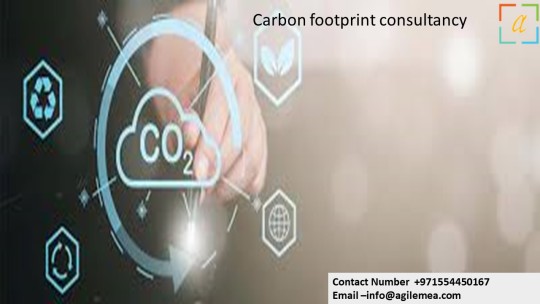
We are a Carbon footprint consultancy In Dubai, investing in green technologies and practices is a smart business move because these cost savings can increase over time. Investors are taking more and more environmental, social, and corporate governance (ESG) considerations into account when making investment decisions, as The Guardian notes. Companies with smaller carbon footprints are frequently thought of as safer long-term investments. A study published in the Journal of Sustainable Finance & Investment found that firms with higher ESG ratings can draw in more capital due to lower loan and equity costs. A company's work environment tends to get healthier and more enjoyable when its carbon impact is reduced. Green areas, better air quality, and natural light can all raise staff morale and productivity. A University of Warwick study found that contented employees are 12% more productive. Furthermore, workers who feel their employers are environmentally conscious tend to be more devoted and prouder of their work, which lowers turnover rates.
As an expert Carbon footprint consultancy In UAE, Companies known for being environmentally conscious or sustainable frequently benefit from access to markets where environmental requirements are given priority. Eco-labels, which show a product's environmental impact, reportedly decide consumers' purchasing decisions (New York Times). Businesses can attract more customers by lowering their carbon footprints and gaining certifications. Businesses with smaller carbon footprints are less likely to be subject to penalties, sanctions, or interruptions to their operations due to governments worldwide enforcing more vital environmental legislation. Companies that take a proactive approach to their environmental responsibilities are frequently better equipped to handle future legislative changes, which gives them a competitive advantage, as CNBC noted. Businesses can directly contribute to preserving ecosystems and natural resources by lowering their carbon footprints.
Being a Carbon footprint consultancy, this protects the environment and community health and guarantees the availability of resources for operations in the future. Reducing a company's carbon footprint has advantages beyond protecting the environment. The numerous benefits range from enhanced brand image and investor appeal to cost reductions and increased efficiency. Sustainability isn't just a catchphrase; it's a corporate strategy that promises environmental responsibility and prosperity, as studies and media sources continually emphasize. It is both the most obvious and the least tangible advantage. However, the effects of climate change are readily apparent: rising sea levels and temperatures, protracted droughts, heat waves, forest fires, and the extinction of entire species. Sadly, these instances become the norm rather than the exception. Reduce your carbon footprint to help fight climate change.
In our role as Carbon footprint consultancy In Dubai, all of this together has a significant effect. The Climate above Accord represents merely the very beginning. Agreements have been established regarding lowering CO2 emissions at every level. Consider the Urgenda objective and the Dutch and European Climate Acts, for instance. Furthermore, the cabinet even aimed to reduce CO2 emissions by 60%. Therefore, the day when SMEs are required to calculate and cut their emissions is just around the corner. The Flemish government has already implemented the CO2 performance ladder as a requirement for construction industry licenses. According to National Geographic, businesses that implement sustainable practices help mitigate the effects of climate change, preserve biodiversity, and safeguard water resources.
0 notes
Text
The Relationship Between Carbon Footprints and Consumer Choices
We as a Carbon footprint consultancy, Individual and group consumer choices have a significant impact on carbon footprints. Transportation, energy sources, and food choices all directly impact an individual's carbon emissions. On a larger scale, collective decisions about laws, companies, and products affect the carbon footprints of entire societies. When sustainable choices are made, carbon footprints can be reduced, and climate change can be mitigated. Some examples are using renewable energy sources, utilizing public transit, and acquiring fewer carbon-intensive products. Encouraging informed decisions and increasing knowledge are critical components of change facilitation. Reducing one's carbon footprint involves using eco-friendly transportation, such as walking and cycling, recycling, and energy conservation. It stands for a dedication to leaving behind a livable and prosperous world for the coming generations.

As a Carbon footprint consultancy In Dubai, reducing carbon footprints is essential for addressing climate change, safeguarding the environment, and securing a sustainable future. It calls for teamwork, creativity, and dedication to making sustainable decisions in all facets of life. Reducing emissions and measuring carbon footprints can mitigate the harmful effects of climate change and slow down its rate of occurrence. Climate change impacts natural resources, biodiversity, and ecosystems. Lowering our carbon footprint may preserve these essential ecosystems and the biodiversity of the earth. Drastic changes in precipitation patterns, protracted droughts, and rising temperatures can reduce crop yields, jeopardize food security, and cause a water shortage. Reducing emissions can help mitigate these dangers and guarantee a steady food and water supply.
In our opinion as Carbon footprint consultancy In UAE, Advances in carbon capture and storage technology, electric vehicles, renewable energy, and energy-efficient building designs facilitate a resilient future. Making the shift to a low-carbon economy can boost employment and economic growth. Putting money into sustainable practices and renewable energy can open up new doors. Also avoided are the expenses associated with damages brought on by climate change. The pursuit of carbon reduction techniques fuels innovation in clean and sustainable technologies. Under international agreements such as the Paris Agreement, numerous countries have pledged to decrease their greenhouse gas emissions. Reducing carbon footprints will require concerted efforts to meet these pledges. Reducing carbon emissions is critical to the planet's and human societies' long-term sustainability.
Being a Carbon footprint consultancy, the production and distribution of food have a significant carbon footprint, which can be reduced using low-carbon agriculture supply chains. These supply chains strive to dramatically reduce greenhouse gas emissions throughout the agricultural journey by using carbon offsetting measures, optimizing energy use, decreasing food waste, and adopting sustainable farming practices. The focus is on making climate-conscious decisions and being environmentally responsible from farm to fork. In line with international efforts to mitigate climate change, these approaches not only lessen our food's carbon footprint but also help build a more resilient and sustainable agriculture industry. Sustainable food supply chains broadly address the issue of our food system's carbon footprint. Every supply chain step, from production and processing to distribution and consumption, is intended to reduce greenhouse gas emissions.
We are renowned Carbon footprint consultancy In Dubai, Sustainable food supply chains lessen the environmental impact of food choices, which prioritize methods including organic farming, sustainable transportation, little food waste, and responsible sourcing. These supply chains coordinate international efforts to mitigate climate change by encouraging ethical and ecologically sustainable food production and reducing carbon emissions. The distance food products travel from their place of production to the consumer's plate is called their "food miles." It directly affects our food's carbon footprint because transportation usually produces more significant greenhouse gas emissions over longer distances. Food miles draw attention to the adverse environmental effects of long-distance transportation, which significantly contribute to the carbon emissions linked to the supply chains for food. A sustainable and climate-friendly food system can only be achieved by prioritizing locally sourced and manufactured items, as they require fewer energy-intensive transportation techniques.
0 notes
Text
BENEFITS OF DETERMINING YOUR BUSINESS'S CARBON FOOTPRINT
As a Carbon footprint consultancy, Concerns about climate change have recently dominated most discussions, leading to new habits among corporations and individuals. An analysis of the global impact of the increasing emphasis on healthy, ecologically friendly habits first considers the adverse effects of carbon foot printing. An individual, company, product, or event's yearly direct and indirect greenhouse gas (GHG) and carbon dioxide emissions are represented by their "carbon footprint." Every product and action should be measured using the Carbon Emission Factor, a particular unit of measurement. The information gathered from all sources and activities during routine operations, transportation, and logistics gives a detailed picture of a company's carbon footprint. Its carbon footprint measures a product's complete process's emissions and volatile organic compounds.
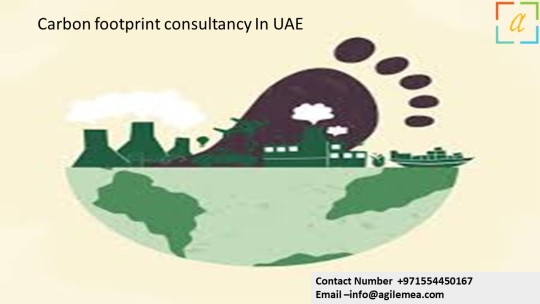
Being a Carbon footprint consultancy In UAE, this covers the production of raw materials, distribution, manufacturing, and product reuse/recycling up till disposal. Although not hazardous, volatile organic compounds (VOCs) are organic substances that exhibit high vapor pressure at ambient temperature and raise long-term health concerns. The detrimental consequences of transportation gasses and electricity usage on the viability of goods and businesses may be well known to many. Experts recommend measuring the same elements from participants outside of the organization and from indirect consumers. The following data on the countries contributing to greenhouse emissions has been made public by the European Union. Determining a company's carbon footprint exposes how wasteful and inefficient it is. This could be advantageous to the expansion and growth of a business.
We as a Carbon footprint consultancy In Dubai, Companies must refrain from generating waste and operating at higher levels. Measuring carbon and greenhouse gas emissions has many benefits. A firm's value chain's carbon emissions can be measured to identify wasteful spending on operations and service components. A company's costs and expenses can be reduced by switching to alternative energy sources, identifying wasted resources, optimizing product distribution capacity, and tracking. As a result, they boost the profit margin. Customers choose which brands to be loyal to base on how well-managed the company is socially and environmentally. They'll even shell out more money. Carbon-neutral products are preferred by over 88% of consumers, according to Carbon Credit Capital.
In our opinion as Carbon footprint consultancy, Companies that follow regulatory bodies will ensure their goods and services are available on the open market. The public admires businesses that promote principles for improving people's lives. Naturally, these acts also affect the viewpoints of shareholders and employees. By capping carbon emissions from power, heat, oil, aviation, and other sources, the EU emissions trading system (EU-ETS) encourages the development of renewable energy sources. Most businesses currently gather data on energy bills, travel expenses, and material sources, which may be used to compute carbon footprints. The process is straightforward. This information is also easily accessible to suppliers regarding their costs.
We are renowned Carbon footprint consultancy In UAE, this is a chance to contribute to the long-term preservation and protection of the environment, enhancing the quality of life for all living things, including humans. A plan can be developed by examining the business's carbon footprint to expand its market, improve customer acquisition and retention rates, and cut down on wasteful spending. The first simple step toward sustainable development and more stringent standards for corporate performance is calculating carbon emissions. In addition to being priced competitively, carbon-neutral goods and services can also satisfy customers' expectations in terms of energy efficiency, recycling and paperless choices, and affordability.
0 notes
Text
The advantages of a corporation tracking its carbon emissions
As a Carbon footprint consultancy, A corporation should endeavor to understand its existing condition and begin tracking its carbon emissions as a first step toward becoming more sustainable. The business sector is frequently implicated when pointing fingers at climate change blame. It isn't easy to measure carbon emissions. Large corporations without carbon measurement and reduction initiatives are now the exception rather than the rule. Apple, Facebook, and even major oil companies like BP and Shell all disclose their carbon footprints. This is due to more than simply the CEOs' environmental concerns. They measured and identified CO2 emissions, which aids in locating inefficiencies or overuse of energy. Reducing greenhouse gas emissions correlates with enhancing a business's process efficiency and cost-effectiveness.

We are renowned Carbon footprint consultancy In Dubai, Walmart found that it uses a lot of energy for heating and cooling its facilities based on its greenhouse gas emissions. As a result, about 10,000 highly efficient rooftop air conditioning and heating units were built. In addition to cutting internal costs, increasing businesses must pay a fee for each tonne of CO2 emissions. This is the so-called system for trading carbon emissions. A carbon tax is an alternative that imposes a fixed cost on each unit of carbon emissions. Both carbon pricing schemes require you to track your emissions. Many claim that these systems are THE way to bring about significant change. Prices for greenhouse gas emissions are rising, there are increasing efforts aimed at pricing carbon, and the private sector is putting in place its internal carbon pricing schemes.
Being a Carbon footprint consultancy In UAE, Tracking and reducing your carbon emissions is becoming mandatory, but it's also a business opportunity to outperform rivals. All of this information is only accessible, though, if your business tracks its carbon emissions—the first step in surviving the change to a sustainable market. Your brand image is another compelling argument for tracking and lowering carbon footprints. Customers are picky about who they do business with, whether they are people or corporations. There is a growing awareness of sustainability, as seen by the polls, business circles, and streets. In the most recent sustainability survey by Euromonitor International, 54% of global consumers said they felt that making ethical purchases had an impact. Customers are searching for methods to reduce their own and their group's carbon footprint, reduce waste, purchase eco-friendly goods, and use services from green businesses.
In our opinion as Carbon footprint consultancy, Emissions transparency has become so fundamental that even the most polluting sectors now reveal their (huge) carbon footprint. Major airlines such as Easyjet and Delta have revealed comprehensive strategies to assess, decrease, and offset their respective carbon footprints to become the most sustainable carriers. Knowledge of sustainability will likely continue to increase. In commercial terms, the sustainable product sales graph in the United States (see below) shows a rising demand for sustainable consumer goods and services. The demand for more sustainable options will increase along the entire B2B supply chain due to these end users' pull. By measuring and lowering your carbon emissions, you can make realistic and scientifically backed claims about your company's sustainability performance.
We believe as a Carbon footprint consultancy In Dubai, Customers are not just stakeholders who care about a company's reputation. Employees not only care deeply about the environment but they are also drawn to organizations that practice environmental responsibility, according to Deloitte's Millennial studies. The company's sustainability has emerged as a preferred tool in the current talent battle. Workers who are motivated and more likely to stick around are those who share the company's ideals. This implies that by including environmental indicators in their business strategy, startups will have a better chance of obtaining funding. As a well-established business, gathering ecological data would offer an additional perspective to enhance market, product, and productivity performance comprehension.
0 notes
Text
Advantages of Carbon Footprint Reduction for Enterprises
As a Carbon footprint consultancy, A company can reap many real benefits by lowering its carbon footprint, which goes beyond being a gesture of environmental awareness. Enterprises that prioritize sustainability are creating a profitable and environmentally sustainable future through enhanced public perception and financial benefits. According to Harvard Business Review research, businesses with a sustainability track record do better operationally and frequently beat their rivals in the stock market. Customers favour companies that practice environmental responsibility as they become more ecologically conscious. According to the Nielsen Global Corporate Sustainability Report, 66% of consumers worldwide are prepared to pay extra for sustainable goods, highlighting the impact of green practices on consumer behaviour. According to BBC News, long-term operational costs are frequently decreased for businesses that invest in environmentally friendly technologies. This includes lower trash disposal costs, lower water consumption costs, and energy savings from energy-efficient appliances.
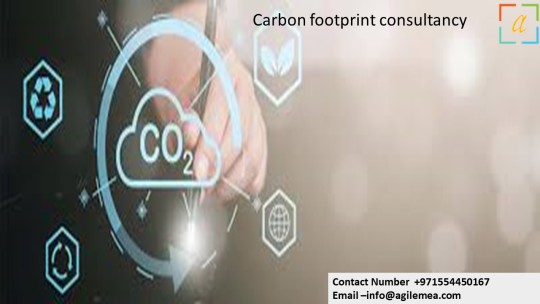
We are a Carbon footprint consultancy In Dubai, investing in green technologies and practices is a smart business move because these cost savings can increase over time. Investors are taking more and more environmental, social, and corporate governance (ESG) considerations into account when making investment decisions, as The Guardian notes. Companies with smaller carbon footprints are frequently thought of as safer long-term investments. A study published in the Journal of Sustainable Finance & Investment found that firms with higher ESG ratings can draw in more capital due to lower loan and equity costs. A company's work environment tends to get healthier and more enjoyable when its carbon impact is reduced. Green areas, better air quality, and natural light can all raise staff morale and productivity. A University of Warwick study found that contented employees are 12% more productive. Furthermore, workers who feel their employers are environmentally conscious tend to be more devoted and prouder of their work, which lowers turnover rates.
As an expert Carbon footprint consultancy In UAE, Companies known for being environmentally conscious or sustainable frequently benefit from access to markets where environmental requirements are given priority. Eco-labels, which show a product's environmental impact, reportedly decide consumers' purchasing decisions (New York Times). Businesses can attract more customers by lowering their carbon footprints and gaining certifications. Businesses with smaller carbon footprints are less likely to be subject to penalties, sanctions, or interruptions to their operations due to governments worldwide enforcing more vital environmental legislation. Companies that take a proactive approach to their environmental responsibilities are frequently better equipped to handle future legislative changes, which gives them a competitive advantage, as CNBC noted. Businesses can directly contribute to preserving ecosystems and natural resources by lowering their carbon footprints.
Being a Carbon footprint consultancy, this protects the environment and community health and guarantees the availability of resources for operations in the future. Reducing a company's carbon footprint has advantages beyond protecting the environment. The numerous benefits range from enhanced brand image and investor appeal to cost reductions and increased efficiency. Sustainability isn't just a catchphrase; it's a corporate strategy that promises environmental responsibility and prosperity, as studies and media sources continually emphasize. It is both the most obvious and the least tangible advantage. However, the effects of climate change are readily apparent: rising sea levels and temperatures, protracted droughts, heat waves, forest fires, and the extinction of entire species. Sadly, these instances become the norm rather than the exception. Reduce your carbon footprint to help fight climate change.
In our role as Carbon footprint consultancy In Dubai, all of this together has a significant effect. The Climate above Accord represents merely the very beginning. Agreements have been established regarding lowering CO2 emissions at every level. Consider the Urgenda objective and the Dutch and European Climate Acts, for instance. Furthermore, the cabinet even aimed to reduce CO2 emissions by 60%. Therefore, the day when SMEs are required to calculate and cut their emissions is just around the corner. The Flemish government has already implemented the CO2 performance ladder as a requirement for construction industry licenses. According to National Geographic, businesses that implement sustainable practices help mitigate the effects of climate change, preserve biodiversity, and safeguard water resources.
0 notes
Text
Why is knowledge of carbon footprint essential?
As a Carbon footprint consultancy, over the past few decades, the fast acceleration of climate change has become a significant concern for many industries. The carbon footprint and unabated release of greenhouse gases into the atmosphere by people is a contributing factor to this intensification. Finding out more about carbon footprints and possible reduction techniques may be beneficial if you're trying to lessen the environmental effect that your company has. In this post, we define a carbon footprint, discuss the significance of comprehending it, and offer tips for reducing your organization's environmental impact. The entire amount of greenhouse gases released by routine human activities such as consuming energy, operating gas-powered cars, throwing away non-recyclable waste, and maintaining a diet high in meat is called one's "carbon footprint." Water vapor, carbon dioxide, methane, nitrous oxide, and ozone are examples of greenhouse gases.
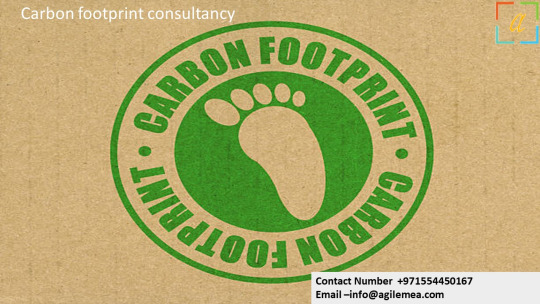
Being a Carbon footprint consultancy In UAE, these gases trap heat in the earth's atmosphere and cause warming, sometimes called the "greenhouse effect." Thus, carbon footprints aid in understanding the effects of human activity on the environment by roughly estimating the gases added to the atmosphere. It is noteworthy that although every individual impacts the environment through their personal carbon footprint, most greenhouse gas emissions are caused by manufacturing and corporate operations. Businesses that use a lot of nonrenewable energy, for example, in the manufacturing of goods, the packaging of goods with recyclable or no compostable materials, and the transportation of goods by energy-inefficient vehicles, like long-haul trucks or aero planes, frequently have a large carbon footprint and release a lot of greenhouse gases into the atmosphere. Professionals in these sectors often must pay close attention to reduction and offset methods.
We as a Carbon footprint consultancy In Dubai, knowing a carbon footprint and how it works is crucial because it indicates the environmental damage caused by human activity. From this point on, companies and professionals can benefit from carbon footprint reduction techniques to lessen the acceleration of climate change. These initiatives might allow groups to cooperate to restore the environment's natural functions. Furthermore, companies could be able to assist in the critical task of obstructing detrimental environmental warming processes, which in turn help to cause rising sea levels, more frequent droughts, dwindling water supplies, decreased agricultural yields, adverse health effects, damaging weather events like natural disasters, and erosion in coastal areas.
We believe as a Carbon footprint consultant, reducing their carbon footprint can provide organizations with several significant advantages in addition to decelerating the rate of climate change. Accountability for environmental sustainability could enhance public perception of your organization and lend it a newfound legitimacy. External stakeholders highly value climate resiliency and may view an organization's efforts to reduce its carbon footprint as commendable. Reducing your company's overall carbon footprint could spur economic growth by investing in and developing clean energy sources. The amount of money available for other business endeavors can vary greatly depending on these choices since they are less expensive than nonrenewable sources.
#Carbonfootprintconsultancy#Carbonfootprintconsultant#Carbonfootprintconsultancyindubai#Carbonfootpritnconsultancyinuae
0 notes
Text
The Relationship Between Carbon Footprints and Consumer Choices
We as a Carbon footprint consultancy, Individual and group consumer choices have a significant impact on carbon footprints. Transportation, energy sources, and food choices all directly impact an individual's carbon emissions. On a larger scale, collective decisions about laws, companies, and products affect the carbon footprints of entire societies. When sustainable choices are made, carbon footprints can be reduced, and climate change can be mitigated. Some examples are using renewable energy sources, utilizing public transit, and acquiring fewer carbon-intensive products. Encouraging informed decisions and increasing knowledge are critical components of change facilitation. Reducing one's carbon footprint involves using eco-friendly transportation, such as walking and cycling, recycling, and energy conservation. It stands for a dedication to leaving behind a livable and prosperous world for the coming generations.

As a Carbon footprint consultancy In Dubai, reducing carbon footprints is essential for addressing climate change, safeguarding the environment, and securing a sustainable future. It calls for teamwork, creativity, and dedication to making sustainable decisions in all facets of life. Reducing emissions and measuring carbon footprints can mitigate the harmful effects of climate change and slow down its rate of occurrence. Climate change impacts natural resources, biodiversity, and ecosystems. Lowering our carbon footprint may preserve these essential ecosystems and the biodiversity of the earth. Drastic changes in precipitation patterns, protracted droughts, and rising temperatures can reduce crop yields, jeopardize food security, and cause a water shortage. Reducing emissions can help mitigate these dangers and guarantee a steady food and water supply.
In our opinion as Carbon footprint consultancy In UAE, Advances in carbon capture and storage technology, electric vehicles, renewable energy, and energy-efficient building designs facilitate a resilient future. Making the shift to a low-carbon economy can boost employment and economic growth. Putting money into sustainable practices and renewable energy can open up new doors. Also avoided are the expenses associated with damages brought on by climate change. The pursuit of carbon reduction techniques fuels innovation in clean and sustainable technologies. Under international agreements such as the Paris Agreement, numerous countries have pledged to decrease their greenhouse gas emissions. Reducing carbon footprints will require concerted efforts to meet these pledges. Reducing carbon emissions is critical to the planet's and human societies' long-term sustainability.
Being a Carbon footprint consultancy, the production and distribution of food have a significant carbon footprint, which can be reduced using low-carbon agriculture supply chains. These supply chains strive to dramatically reduce greenhouse gas emissions throughout the agricultural journey by using carbon offsetting measures, optimizing energy use, decreasing food waste, and adopting sustainable farming practices. The focus is on making climate-conscious decisions and being environmentally responsible from farm to fork. In line with international efforts to mitigate climate change, these approaches not only lessen our food's carbon footprint but also help build a more resilient and sustainable agriculture industry. Sustainable food supply chains broadly address the issue of our food system's carbon footprint. Every supply chain step, from production and processing to distribution and consumption, is intended to reduce greenhouse gas emissions.
We are renowned Carbon footprint consultancy In Dubai, Sustainable food supply chains lessen the environmental impact of food choices, which prioritize methods including organic farming, sustainable transportation, little food waste, and responsible sourcing. These supply chains coordinate international efforts to mitigate climate change by encouraging ethical and ecologically sustainable food production and reducing carbon emissions. The distance food products travel from their place of production to the consumer's plate is called their "food miles." It directly affects our food's carbon footprint because transportation usually produces more significant greenhouse gas emissions over longer distances. Food miles draw attention to the adverse environmental effects of long-distance transportation, which significantly contribute to the carbon emissions linked to the supply chains for food. A sustainable and climate-friendly food system can only be achieved by prioritizing locally sourced and manufactured items, as they require fewer energy-intensive transportation techniques.
0 notes
Text
What is the carbon footprint of an organization?
We as a Carbon footprint consultancy In Dubai, the carbon footprint of a product and a firm are two independent but related concepts that measure different aspects of carbon emissions. For businesses looking to reduce their carbon footprint and implement sustainable practices, both are crucial factors to consider. By estimating emissions, companies can meet the increasing demand for ecologically friendly products and operations and contribute to broader environmental goals. The entire quantity of greenhouse gas (GHG) emissions produced by an organization's operations, including its buildings, manufacturing procedures, transportation, refrigeration, and other activities, is called its "carbon footprint." It covers all three domains, including indirect supply chain emissions and direct and indirect effects from energy purchases.

As a Carbon footprint consultancy, Emissions from the supply chain, employee commuting, business travel, waste management, energy and fuel use, and trash management all contribute to an organization's carbon footprint. It considers emissions from every action the business directs or controls, including the product disposal at the end of its useful life. An overview of a company's emission sources and effective control of its environmental impact is made possible by counting its carbon footprint. Sustainable activities are made possible by ongoing monitoring and knowledge of a company's carbon footprint. Businesses frequently calculate their carbon footprint to evaluate their environmental performance, establish reduction goals, and implement plans to cut emissions overall.
Being a Carbon footprint consultancy In UAE, the carbon footprint of a product focuses on the emissions directly related to its manufacture, usage, and disposal. For businesses, the carbon footprint of a product is typically represented in terms of carbon dioxide equivalent (CO2e). It calculates the quantity of greenhouse gases emitted during the extraction, manufacturing, distribution, consumer use, and eventual recycling or disposal of a product. The carbon footprint of a product offers information on how it affects the environment and points out areas for development and sustainable design. Understanding it will enable selecting suitable energy sources for materials, production processes, modes of transportation, recycling, and waste management procedures. Understanding the carbon footprint will help the business efficiently manage its supply chain.
In our opinion as Carbon footprint consultancy In Dubai, A product's carbon footprint explores the unique emissions connected to a single good or service, whereas a company's carbon footprint represents the total environmental impact of the complete enterprise. Organizations will be able to provide customers with more environmentally friendly and sustainable goods and services if they clearly understand the magnitude of their carbon footprint and have examined and reduced the emissions of specific items. Calculating a product's carbon footprint is beneficial for businesses since it enables them to assess their environmental impact and utilize that information to make sustainable and product design decisions. Thanks to this, they will gain a competitive edge, pique the curiosity of investors, and win over clients.
We believe as a Carbon footprint consultancy; Businesses will adhere to EU directives since big and small businesses will soon need to report on environmental issues. Companies will help combat climate change and global warming by lowering CO2 emissions and eventually reaching neutrality. Obtaining information regarding a company's supply chain's carbon footprint requires a small financial investment. It is a wise investment, without a question. Ongoing monitoring of a contractor's environmental impact, corporate governance, and social responsibility already shows the quality of the company's business. The number of greenhouse gases created at each production stage is added, and the result is divided by the total number of products to determine a product's carbon footprint.
0 notes
Text
Advantages of Reducing Your Organization's Carbon Footprint
We are a Carbon footprint consultant, using carbon foot printing, a potent tool, organizations may evaluate their environmental impact and create plans to lower their carbon emissions. Organizations may boost their competitive edge, achieve cost savings, improve brand reputation, and improve their environmental performance by identifying high-impact areas and implementing effective carbon emission reduction initiatives. We will go into greater detail about the advantages of carbon foot printing and how it can assist businesses in having a positive environmental and social effect. As carbon emissions are a primary driver of climate change and its disastrous environmental impacts, lowering an organization's carbon footprint also reduces its environmental impact.

In our understanding as Carbon footprint consultant in UAE, slow down the rate of global warming by lowering your organization's carbon footprint, which reduces the quantity of greenhouse gas emissions emitted into the environment. An organization's carbon footprint can be measured to gain insight into its "carbon hotspots" or the parts of its activities that generate the most greenhouse gas emissions. Organizations can focus and prioritize their efforts to reduce emissions by identifying these hotspots. Transportation, trash disposal, energy use, and the supply chain are typical carbon hotspots. Three categories are used to classify greenhouse gas emissions: scope 1, scope 2, and scope 3. The Greenhouse Gas Protocol developed these scopes as part of its Corporate Accounting Reporting Standard to give all organizations a global framework for tracking and controlling their greenhouse gas emissions.
To help you as Carbon footprint consultant in UAE, double counting of emissions in corporate reporting is lessened with the aid of this methodology. Reducing and measuring an organization's carbon footprint can boost its standing with investors, clients, consumers, and staff and show a dedication to sustainability. Customers expect more from businesses in terms of their commitment to sustainability as they become more aware of environmental challenges. Organizations can become leaders in their respective industries and convey their ecological efforts to stakeholders by measuring and reporting their carbon footprint. This demonstrates how customers are putting more and more pressure on businesses to explain how they can reduce their environmental effects.
We believe as a Carbon footprint consultancy, nearly two-thirds (65%) of survey participants indicated in another Unify research that they were likelier to work for an organization with strict environmental rules. Human rights, social justice, and climate change are all problems that are becoming more and more important, particularly for millennial workers, who currently make up the majority of the workforce. An organization's performance can be positively impacted by improved reputation and excellent branding, which can raise employee engagement, investor interest, and customer loyalty. Sustainability reports will now be needed from a larger group of listed SMEs and large corporations, totaling about 50,000 entities.
As an expert Carbon footprint consultancy, all significant businesses operating in the EU, including those with headquarters outside the EU, will have to report their emissions, including emissions from the Scope 3 value chain. Furthermore, a requirement of EU law called the Sustainable Finance Disclosure Regulation (SFDR) attempts to make sustainability issues more transparent for financial players.The National Greenhouse and Energy Reporting (NGER) program serves as a unified national framework for reporting energy production and consumption and greenhouse gas emissions from organizations in Australia.
0 notes
Text
Advantages of Reducing Your Organization's Carbon Footprint
We as a Carbon footprint consultancy, Organizations can evaluate their environmental impact and create plans to lower their carbon emissions using the powerful carbon foot printing technique. Organizations may boost their competitive edge, achieve cost savings, improve brand reputation, and improve their environmental performance by identifying high-impact areas and implementing effective carbon emission reduction initiatives. We will go into greater detail about the advantages of carbon foot printing and how it can assist businesses in having a positive environmental and social effect. A company's environmental impact can be directly decreased by lowering its carbon footprint because carbon emissions play a significant role in climate change and its disastrous environmental effects. By reducing your company's carbon footprint, you can slow global warming by releasing fewer greenhouse gas emissions into the atmosphere. Internet Fusion Group (IFG) is an illustration of a company that has demonstrated notable cost savings by calculating its carbon footprint and comprehending its environmental impact.
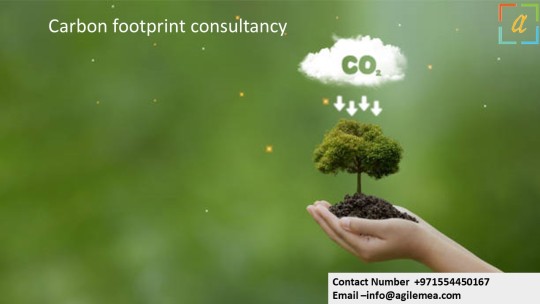
Being a Carbon footprint consultancy In Dubai, an organization's carbon footprint can be measured to gain insight into its "carbon hotspots" or the parts of its activities that generate the most greenhouse gas emissions. Organizations can focus and prioritize their efforts to reduce emissions by identifying these hotspots. Transportation, trash disposal, energy use, and the supply chain are typical carbon hotspots. Three categories are used to classify greenhouse gas emissions: scope 1, scope 2, and scope 3. The Greenhouse Gas Protocol developed these scopes as a part of its Corporate Accounting Reporting Standard to give all kinds of businesses and industries a global framework for tracking and controlling their greenhouse gas emissions. By preventing "double counting," this paradigm aids companies' emissions reporting. For instance, transition to energy-efficient appliances or lighting, and your energy costs go down considerably over time.
In our opinion as Carbon footprint consultancy In UAE, Reducing and measuring an organization's carbon footprint can boost its standing with investors, clients, consumers, and staff and show a dedication to sustainability. Customers expect more from businesses in terms of their commitment to sustainability as they become more aware of environmental challenges. Organizations can become leaders in their respective industries and convey their ecological efforts to stakeholders by measuring and reporting their carbon footprint. This demonstrates how customers are putting more and more pressure on businesses to show how they reduce their environmental effects. Nearly two-thirds (65%) of survey participants indicated in another Unily research that they were likelier to work for an organization with strict environmental rules. Similarly, you can discover ways to lower transportation emissions by encouraging carpooling or driving more fuel-efficient cars.
We are renowned Carbon footprint consultant In Dubai, Human rights, social justice, and climate change are all problems that are becoming more and more important, particularly for millennial workers, who currently make up the majority of the workforce. An organization's performance can be positively impacted by improved reputation and excellent branding, which can raise employee engagement, investor interest, and customer loyalty. Regulations require organizations to assess their carbon footprint to track and lower greenhouse gas emissions in many nations and areas. Environmental activities undertaken by many EU organizations must comply with the Corporate Sustainability Reporting Directive (CSDR). Determining your organization's carbon footprint can assist in identifying areas where you can cut back on your energy use and greenhouse gas emissions. Consequently, you can use less energy and other resources.
#Carbonfootprintconsultancy#Carbonfootprintconsultancyindubai#Carbonfootprintconsultancyinuae#Carbonfootprintconsultantindubai
0 notes
Text
The Advantages of Paperless Transactions: Lower Carbon Footprint
We are a Carbon footprint consultancy In UAE; we are all impacted by global warming as individuals and as companies. The atmosphere and oceans of the earth are getting hotter. This is having a significant impact on our globe. Thankfully, people are becoming more conscious of global warming and the need to reduce their carbon footprint. Businesses have a social and business obligation to demonstrate their concern for the environment, their workforce, and the community. Customers need complete transparency from you when it comes to your environmental policies.
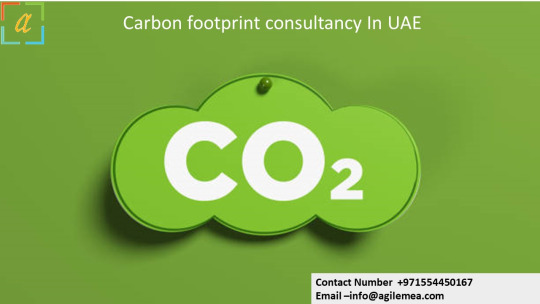
As a Carbon footprint consultancy In Dubai, you must use efficient carbon management measures to lessen your carbon footprint and, thus, your environmental impact. This is not simply a selfless work style; fully upholding corporate responsibility will boost the number of potential consumers. There is a simple solution that will drastically reduce the amount of paper you use in your office, which will reduce your storage and haulage costs in the long run. This will allow you to increase revenue and efficiently use your resources. Making sure you take full corporate responsibility in this way will increase your potential customers.
As a Carbon footprint consultancy, the elite or online-only business community no longer needs to use data management and storage. This has several advantages and is a wise decision for firms today. You won't need to keep printing crucial corporate documents if they are stored on a central server that anybody can access. Look at the corporate history book, the fire safety policy, or the staff manual. These documents are frequently printed and sent out to each new group of employees, as well as occasionally again for a referral or when they are being reviewed. Anyone can access these papers at any time thanks to a single master digital copy saved privately and securely on the cloud.
Being a Carbon footprint consultancy In UAE, Businesses are offering a wide range of paperless solutions to contemporary business issues. Secure email services are available to transmit critical or confidential documents. Every few years, new guidelines for secure data storage are established. Even if you still need paper copies of some documents, having a secure digital copy off-site in a safe place is a terrific method to guarantee quick recovery from floods or fires that may otherwise put your firm at a stop.
In our role as a Carbon footprint consultancy In Dubai, Governments worldwide are currently establishing goals for lowering their carbon footprints. Soon, even tiny firms must abide by carbon reduction laws. Additionally, many customers are actively picking businesses and service providers based on their stance on environmental issues and commitment to lowering carbon emissions. However, many copies have been made; they are only immediately rendered valuable and only fit for the shredder if they need to be reviewed or rewritten.
0 notes